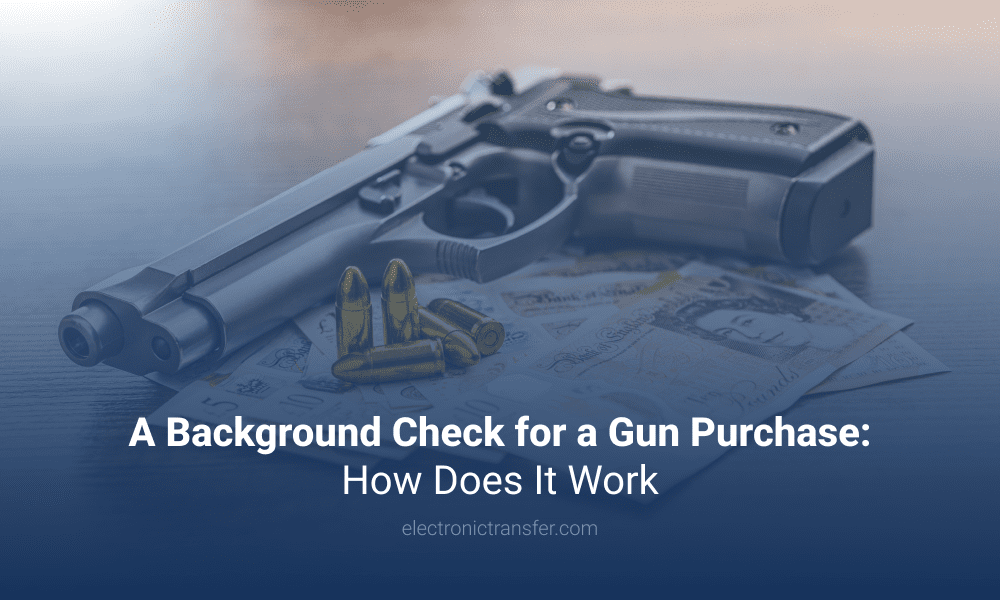A Background Check for Gun Purchases: How Does It Work?

Buying a firearm is not like buying a cheesecake – you can’t just waltz into the shop, buy one and leave. After all, a lot of bad things can happen when a gun falls into the wrong hands.
This is where we need to talk about background checks before purchasing a firearm. – how long is the background check good for, and what is required from you?
Follow along as we find the answers to these questions, and much more.
Background Checks: How Do They Work?
The first step you need to take before you purchase a gun is to fill out Form 4473. It contains 16 personal questions about your background, such as criminal record, drug use, and so on.
After you have completed the form, the gun store where you have chosen to purchase your firearm, will contact The National Instant Criminal Background Check System (NICS) to submit both your answers and your Social Security number.
De facto, the Federal law limits the process of background checks to three business days. The sale can be completed if an FFL isn’t informed that it’s against the law to sell to an individual.
The good news is that the vast majority of background checks only take a few minutes. Roughly 2% of applicants are rejected, with the most common reasons for denial being:
- Criminal and mental health history.
- Dishonorable military discharges.
- Unlawful immigration status.
- Documented history of domestic violence.
- History of drug use.
Ultimately, there is no reason to be worried about a background check for gun purchases if you have not been involved in any unlawful activities.
Why Do We Need Background Checks?
The background check for gun purchases was first introduced in 1993. The Brady Handgun Violence Prevention Act (commonly known as the Brady Law) was enacted after press secretary Jim Brady was shot during an assassination attempt on Ronald Reagan
The Brady Law requires all FFLs to run background checks on people purchasing guns, through the National Instant Criminal Background Check System (NICS).
It amended the Gun Control Act of 1968, which was passed in response to the assassination of John F. Kennedy, and prohibited certain people (fugitives, substance users, people convicted of domestic violence crimes, etc.) from buying guns.
Additionally, retailers and individuals selling firearms were required to obtain a Federal Firearms License (FFL) and comply with certain requirements under the Gun Control Act of 1968.
What States Do Not Require Background Checks When Buying a Gun?
Not all states require background checks. Instead, concealed weapon permits or other types of licenses may be mandatory.
- Alaska. Concealed weapons permit marked NICS-Exempt
- Arizona. Concealed weapons permits
- Arkansas. Concealed weapons permits issued on or after April 1, 1999
- California. Entertainment Firearms Permit only
- Georgia. Georgia firearms licenses
- Hawaii. Permits to acquire and licenses to carry
- Idaho. Concealed weapons permits
- Iowa. Permits to acquire and permits to carry concealed weapons qualify
- Kansas. Concealed handgun licenses issued on or after July 1, 2010, qualify as alternatives to background checks
- Kentucky. Concealed Deadly Weapons License (CCDW) and Judicial Special Status CCDW issued on or after July 12, 2006
- Louisiana. Concealed handgun permits issued on or after March 9, 2015, and lifetime concealed carry permits for the initial five-year period beginning on the original issuance date
- Michigan. License to Purchase a Pistol (LTP) are the only permits that qualify as a NICS alternative
- Mississippi. License to carry concealed pistol or revolver issued to individuals under Mississippi Code Section 45-9-101 (Security guard permits issued under Mississippi Code Section 97-37-7 do not qualify.)
- Montana. Concealed weapons permits
- Nebraska. Concealed handgun permit (Handgun purchase certificates.)
- Nevada. Concealed carry permit issued on or after July 1, 2011
- North Carolina. Concealed handgun permits
- North Dakota. Concealed weapons permit issued on or after Dec. 1, 1999
- Ohio. Concealed weapons permit issued on or after March 23, 2015
- Oklahoma. Self Defense Act Handgun Licenses issued after November 1, 2021, qualify (during the initial five-year period only) beginning on the original issuance date.
- South Carolina. Concealed weapons permits
- South Dakota. Gold Card Concealed Pistol Permit and Enhanced Permit to Carry a Concealed Pistol issued on or after Jan. 1, 2017, and regular concealed carry permits issued on or after July 1, 2018
- Texas. Concealed weapons permits
- Utah. Concealed weapons permits
- West Virginia. Concealed handgun license issued on or after June 4, 2014
- Wyoming. Concealed weapons permits
How to Optimize Your FFL Business With Electronic Transfer?
Running an FFL business comes with a lot of challenges. From complying with the various regulations to dealing with declining sales, we at Electronic Transfer are completely aware of what you are going through.
This is why partnering up with us can simplify your day-to-day operations and improve your productivity, but that’s not all – we ensure compliance and security, focus on customer service, and provide multiple payment options.
We can optimize your processes, and maximize your success in the FFL Merchant Services industry.
Final Words
In a nutshell, the background check for gun purchases is a useful regulation. After all, it is better to be safe than sorry.
Keep in mind, though, that you should always check your local laws and regulations before buying a firearm. A background check might not be necessary in your state.
That said, we’d like to add that we are the preferred credit card processor of GunBroker.com. You too can trust our FFL friendly merchant services to alleviate your firearms business and take advantage of our advanced FFL dealers services, including quick approvals, scalability, and regulatory compliance.


